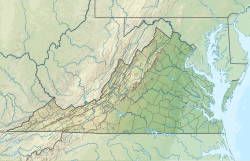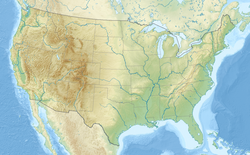Williams Stadium
"The Bill" | |
 View of the stadium in 2018 | |
| Former names | Willard May Stadium |
|---|---|
| Location | 1972 University Boulevard, Lynchburg, Virginia 24502 |
| Coordinates | 37°21′14.4″N 79°10′30″W / 37.354000°N 79.17500°W |
| Owner | Liberty University |
| Operator | Liberty University |
| Capacity | 25,000 (2018–present)
Former capacity: List
|
| Record attendance | 50,000+ (2017 Commencement) |
| Surface | FieldTurf |
| Construction | |
| Broke ground | May 8, 1989 |
| Opened | October 21, 1989 |
| Renovated | 2010–2011, 2017–2018 |
| Expanded | 2010, 2018 |
| Construction cost | $18 million ($44.2 million in 2023 dollars[1]) |
| Architect | Haken/Corley and Associates of Raleigh, N.C. |
| General contractor | McDevitt & Street[2] |
| Tenants | |
| Liberty Flames (NCAA) (1989–present) | |
| Website | |
| liberty.edu/williamsstadium | |
Arthur L. Williams Stadium is a 25,000-seat football stadium located on the campus of Liberty University in Lynchburg, Virginia, USA. The stadium was built in 1989 and plays host to Liberty Flames football, which is a part of the NCAA Division I - Football Bowl Subdivision (FBS). A new field house has recently been constructed at the north end of the stadium. This new facility houses a new home locker room, coaches offices, meeting rooms and training facility as well as a 16,000-square-foot (1,500 m2) weight room. In the 2009 off season, Liberty University added a video scoreboard on the north end of the field. The video scoreboard measured 20 feet (6 m) tall and 36 feet (11 m) wide.[3] This video board was replaced by a massive new high-definition video board in time for the 2018 football season.
In September 2011, a ribbon video board was added to the facade of the upper deck. This too was replaced by a state-of-the-art ribbon video board on both the eastern and western facades of the upper deck in 2018.
The stadium was named in 1994 to honor Arthur L. Williams Jr., who is a major contributor to the university.[2]
Expansion
[edit]Liberty University President Jerry Falwell Jr. announced on August 28, 2009, a three-phase addition to Williams Stadium. The plan was to increase the seating capacity of the stadium from 12,000 seats to 30,000. The first phase of the construction included a five-story press box and expanded the stadium by 7,200 seats. This was done by adding a second deck to the home side of the stadium and lengthening the east and west stands of the stadium.
The seating capacity was 19,200 after phase one was completed. The estimated cost for the first phase of the project was $18 million. The new press tower was ready for Liberty's home game against Savannah State held on October 2, 2010. The tower includes 18 luxury suites, all of which were sold for the 2010 season.
Phase two has added a second deck to the student side, which has increased capacity to 25,000, beginning with the 2018 football season. The estimated cost for the second phase of the project was $40 million. Phase three will complete a "horseshoe" around the south end zone, bringing the total capacity to 30,000.[4] Williams Stadium has the potential to be expanded past 60,000 in the future.
Gallery
[edit]See also
[edit]References
[edit]- ^ 1634–1699: McCusker, J. J. (1997). How Much Is That in Real Money? A Historical Price Index for Use as a Deflator of Money Values in the Economy of the United States: Addenda et Corrigenda (PDF). American Antiquarian Society. 1700–1799: McCusker, J. J. (1992). How Much Is That in Real Money? A Historical Price Index for Use as a Deflator of Money Values in the Economy of the United States (PDF). American Antiquarian Society. 1800–present: Federal Reserve Bank of Minneapolis. "Consumer Price Index (estimate) 1800–". Retrieved February 29, 2024.
- ^ a b "Williams Stadium - Quick Facts". liberty.edu. Retrieved September 19, 2015.
- ^ "New high-definition scoreboard installed at Williams Stadium". liberty.edu. Retrieved August 1, 2017.
- ^ "Williams Stadium". stadiumjourney.com. Retrieved August 1, 2017.



